#not much symbolism going on here but
Text
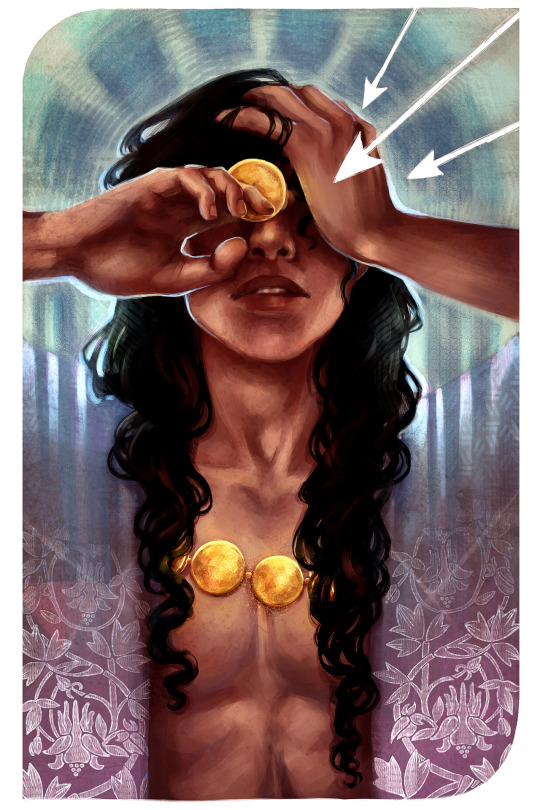
Caranthir
<< 4 >>
#Caranthir#my love#silmarillion#silm#the silmarillion#tolkien#and finally the quest of completing all 7 of them goes on [epic music in the background]#i had a hard time constructing a card for caranthir and i quit all my previous ideas and just drew something that felt right#resulting in a piece that isnt really what i wanted but i had soo much fun drawing him <3#not much symbolism going on here but#i choose columbine on his mantle - as a symbol for grief and also self hatred as columbine stands for weakling#columbine is a loaded flower in christian symbolism - and as a parallel i feel like caranthir is quite religious#like staying true to customs and traditions and seeking help in prayers to Eru as a way to control his wild emotions#i have to stop here - this is a rabbithole 8'D
576 notes
·
View notes
Text
So, about that one AU that's been marinating in my mind for years
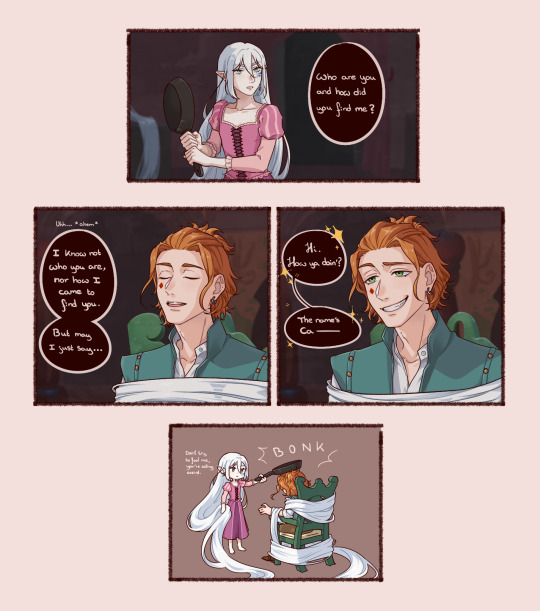
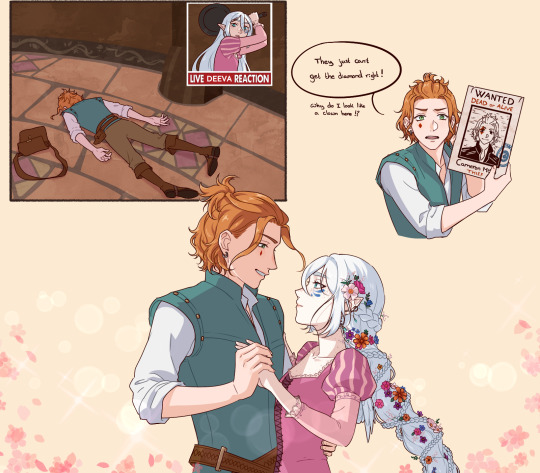
#'second canvas will be just simple sketches' *half cleans sketches* *adds base color* *adds shading* *adds bg* WHY AM I LIKE THIS 😭#anyway- you know how the flower that gave Rapunzel her powers (and also the Kingdom) is associated with the sun?#well. here it's the opposite bc Deeva is moon coded! :]#Gotta love the fact that her wings emphasize the bird in a cage symbolism....#Ofc she doesn't have much experience flying in this AU since Mother Gothel forbid her from going outside#Talking about Mother Gothel... it's Azul HGSAHD#at first I thought maybe Vil or Crewel? but since the character later kinda makes a deal w the twin thieves it fitted him more(?)#Also yes. Cater's alias is Cameron Mägi bc... Mägi Cameron..... Magicam.... 💀💀#it doesn't sound as cool as Flynn Rider but honestly I didn't know what to call him LMAO#I'll be back w this AU someday! I still haven't drawn the iconic lantern scene!!!!#twisted wonderland#twst#twisted wonderland oc#twst oc#twst cater#deeva twst#cateeva#my art
725 notes
·
View notes
Text
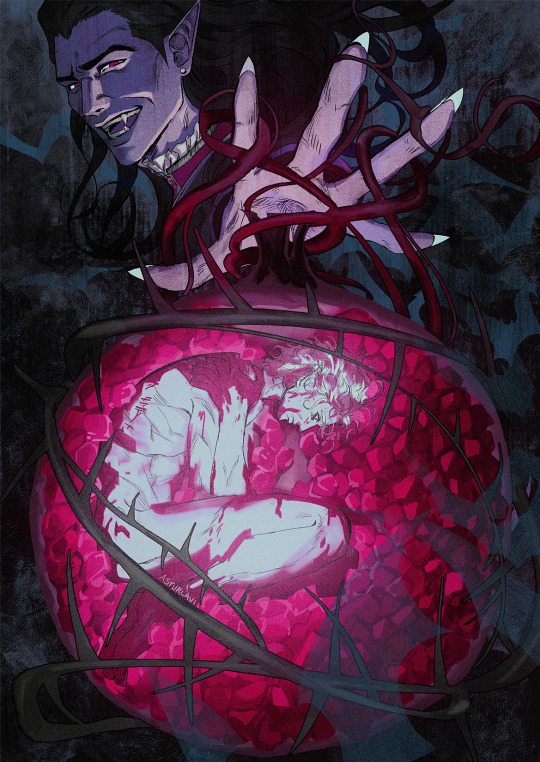
the price for daring to live
#*slaps this art*#there's so much symbolism here that will go ignored#astarion#cazador#baldur's gate 3#bg3#baldur's gate astarion
905 notes
·
View notes
Text
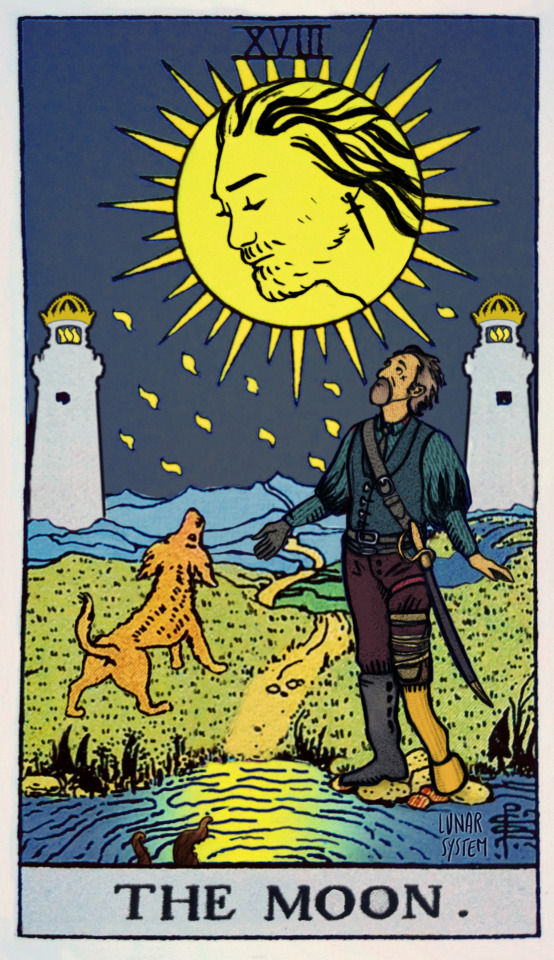
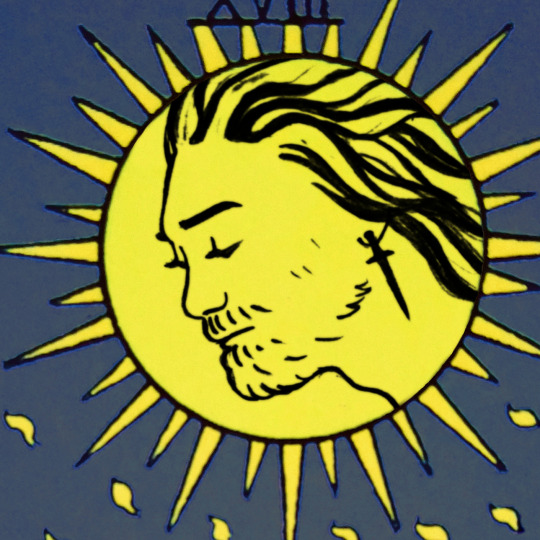
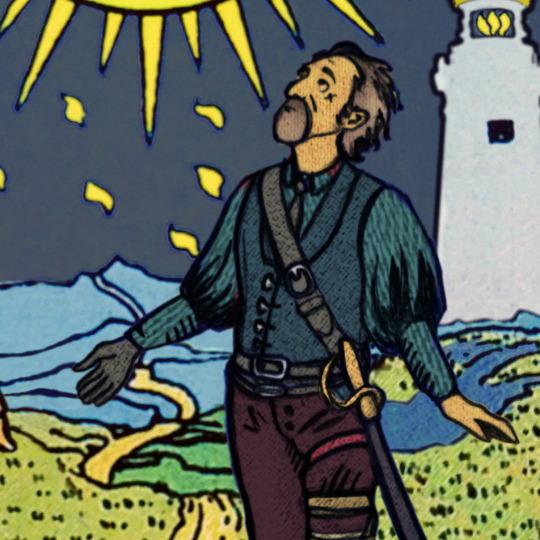
Izzy Hands: The Moon.
Re-imagined from the traditional Ride-Waite-Smith tarot, this version of the Moon shows Izzy taking the shape of a lone Lover, longing for what he cannot reach.
Longer exploration of the card's symbolism under the cut.
Symbolism of the card
I initially meant this card to be specifically Izzy's, but he is once again unseparable from Ed. Though the moon itself is depicted as Ed, it is through Izzy that I interpret the journey of the card. Feel free to invent your own interpretation as well!
In the original version of the Moon we see a dog, a wolf, and a crayfish. Izzy takes the place of the wolf, marking him as wild and untameable. He is accompanied by a dog, symbolizing his loyalty. The crayfish has retreated, and we can see a monster lurking in the depths of the water, reminding us of the beasts that lie within.
Rachel Pollack (2011) writes: "The Moon signifies the dangerous time between the end of one world structure and the beginning of another. On the emotional level it can indicate the strange state when something powerful has ended and you find yourself thrown back on your instincts."
In the card Izzy already has his wooden leg. He his stepping into his role as the Unicorn, marking a shift in his loyalty and his place in the world. His reign as Blackbeard's first mate is ending, and a whole new world order is being imagined.
Ed is also seen in a new light. With his short beard, he is at the end of his captaincy, possibly even at the end of his piracy. He as the Moon is illuminated by the light of the Sun, personified by Stede in another card, The Sun.
Izzy bears witness to their combined light, unreachable to him on the ground. He teeters at the edge of the water illuminated by that very light, and is faced with a choice. Will he turn, follow the path and try to reach the unreachable? Or will he explore the unknown waters in front of him?
In tarot, water symbolizes emotions, intuition and subconscious. Pollack writes: "Here in the unknown territory our animal selves take over. We cannot suppress the wild emotions but only travel through them." The message of the Moon beckons Izzy to step into the water and face his emotions.
However, there are also dangers in the murky waters of the subconscious. Pollack continues: "The Moon card calls forth powerful dreams, visions, and the power of the feminine." In tarot water is a feminine element. Izzy, a beacon of masculinity, has in the past confused the feminine with the monstrous. He is now dared to invite the feminine within him to the surface. His posture already mirrors that of the feminine lover from the Lovers-card. It also calls back to the Fool, to someone at the beginning of their self-discovery.
Tl;dr: Izzy, the Fool and the Lover, is on a journey from one world to another. Will he follow the path and try to reach the unreachable, or will he find the courage to plunge into unknown waters?
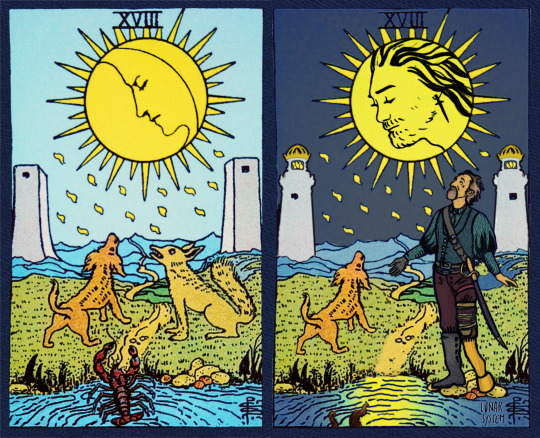
A comparison between the original Rider-Waite-Smith card from 1909 and the re-imagined version
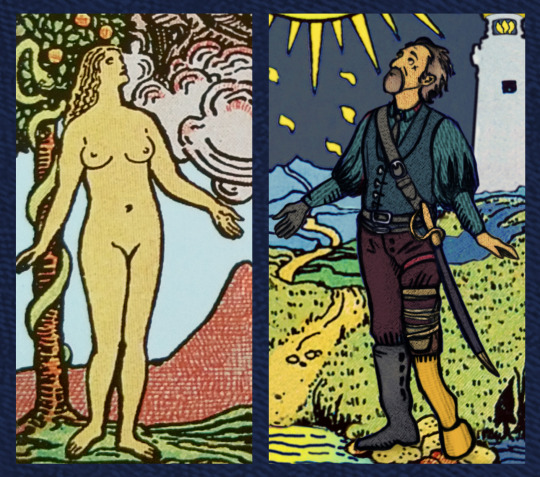
Izzy's pose mirrors the feminine Lover
Sources
Image source: Pamela Colman Smith, 1909, republished as Tarot of A. E. Waite, 2016, AGM-Urania, Germany
Text source: Rachel Pollack, A Journey of 78 Steps, 2011, as cited in the booklet for instruction and guidance of Tarot of A. E. Waite, 2016, AGM-Urania, Germany
#there is even more symbolism in the lighthouses that are topped with the domes from the Tower but it's so much already#it's about the journey between life and death#ofmd#our flag means death#izzy hands#edizzy#steddyhands#blackhands#i'm tagging this as ships cause i ship them all and i made this with shipperly intentions#even if it's not like explicitly shipping content#ed teach#edward teach#blackbeard#gosh i went to some deep waters with this myself#i mean there is so much to interpret here#is izzy shooting for the moon with ed? has he lifted ed high on the pedestal himself?#what does it mean that the water is lit by moonlight?#to me this is the point in fics where izzy does not yet know how he would fit in the steddyhands triangle and doesn't see it possible#and maybe it won't be unless he accepts some things and allows himself to feel#but it can also be read that he needs to let ed go#in either case water is discovery and acceptance#i am planning to make ed the star and stede the sun as well!#my fanart
182 notes
·
View notes
Text
genuine question, am I really not supposed to read into the fact that Kaneki ate part of Hide’s face, of all things? his mouth??
#tokyo ghoul#tokyo ghoul re#kaneki ken#hideyoshi nagachika#hidekane#I never actually finished re but when I found out what happened to hide… I mean#Tokyo ghoul is chock full of symbolism and I’m supposed to see some deeper meaning in kaneki’s decision here?#or hide’s for that matter???#it’s one thing for your platonic best bro to say hey eat part of me so you can fight and survive#like. you’d go for something he can live with and possibly hide. like the shoulder. or side#or his leg#I know Kaneki isn’t totally in his right mind but that makes the decision so much stranger actually???#his mouth. he ate his mouth#sorry I’m still losing my mind over this revelation
200 notes
·
View notes
Text
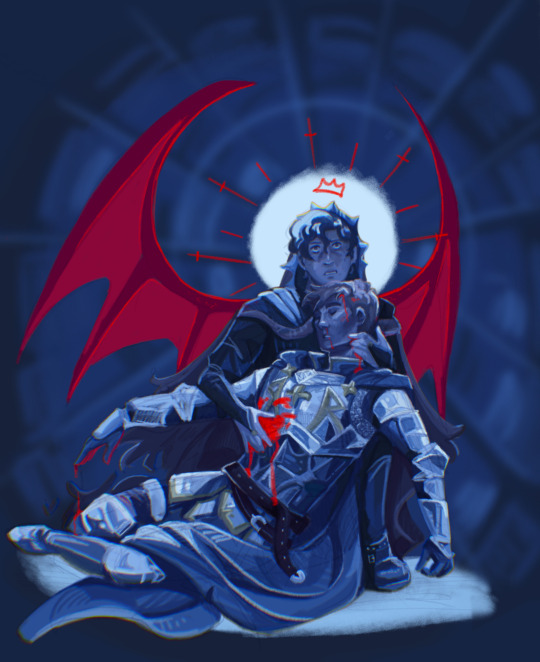
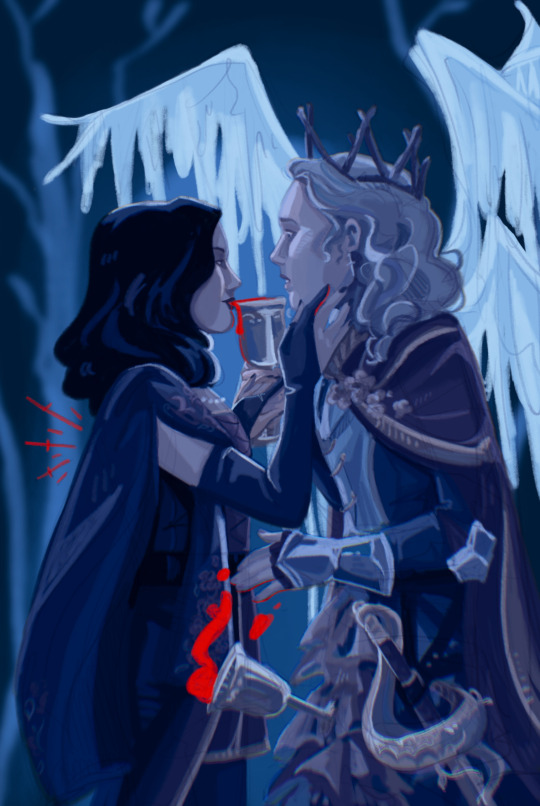
red paladin and his hellcaster | enchantress and her gryphon queen
#i usually put my rvd stuff on my side acc but these i spent enough time on that i shrimply must put them here ^_^#season three i love you so much. gryphons and gargoyles i love you.#such a You Are Going To Die For Love season… such immaculate vibes… SO MUCH FUN#time of my fucking life. im approaching it in my rewatch and having sooooo much fun#riverdale#jarchie#beronica#archie andrews#jughead jones#betty cooper#veronica lodge#framed the jarchie for maximum jesus archie symbolism of course. and the beronica to match their first kiss. of COURSE. i have fun#core four
315 notes
·
View notes
Text
One of my favourite parts of "Persuasion" is when Frederick says to Anne "You did not use to like cards; but time makes many changes." and then she responds "I am not yet so much changed." and then he says "It is a period, indeed! Eight years and a half is a period!" because this is such an important part of the book. It's when they both truly realise that neither of them is the same as they were 8 years ago. They're not 19 and 23 anymore, but 27 and 31. They both have scars and are more mature with a better understanding of the world and, more importantly, each other. And all part of each of them wants to do is go back to the beginning and rewrite the story from the start so they aren't separated and have to go through over eight years of emotional agony, but they can't, so they have to write a new ending. And they do.
#persuasion#jane austen#anne elliot#frederick wentworth#isla talks#this is the result of my dissertation writing. my brain is FLYING with thoughts and ya girl can barely keep up#like?#I LOVE THIS BOOK SO FUCKING MUCH#just... the ✨yearning✨ and the allusion and the hidden meanings of everything and the SYMBOLISM#i'm going insane over here#this dissertation is making me go crazy in so many ways i can't even describe it#but also thank you jane for this piece of art because you're a gift and i love you ❤️
715 notes
·
View notes
Text
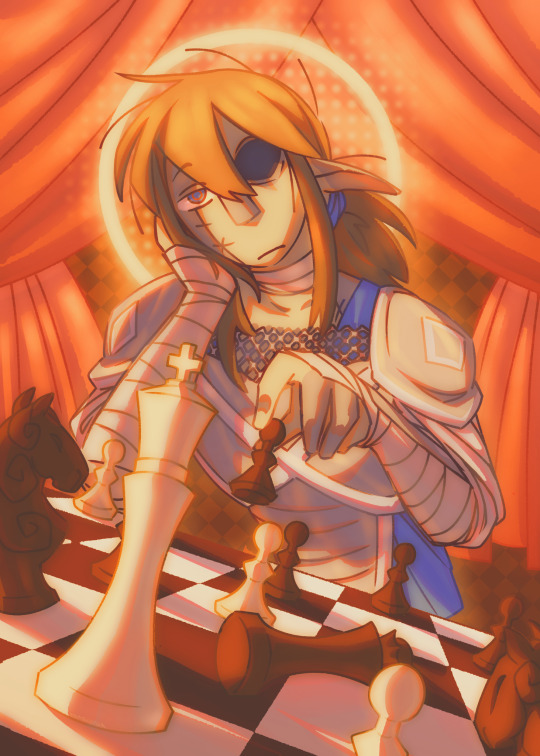
♟️ unholy
#:3 .... we love chess metaphors over here#more in the “hero playing kinger for a fool underneath his own nose” saga#or. more or less just the “hero fucking hates the monarchy” saga#same thing#(insert tf2 spy gif)#thats literally pretty much whats going on with him and i love every second of it#the amazing digital circus#tadc hero#the amazing digital carnival#carnival au#MY ASS AINT IGNORING THE FACT THAT SM TOLD ME IM RIGHT BTW. IM RUNNING WITH THIS SHIT BOYYYYYY#MORE HERO STUFF ON THE HORIZON REGICIDE CRUSADE MY BELOVEDSSS‼️‼️‼️‼️#so far goose is the only one whos mentioned and found the symbolic details :3#see if you can too viewer<3#if you can ill give you a cookie🪤
70 notes
·
View notes
Text
Lord I cannot believe it took me this long to realize this, but. Vnc's refrain of Noé trying to grab Vanitas's hand is a metaphor.
This whole time I've been reading the constant references to "Noé grabs Vanitas and saves him from falling, but one day he'll fail" as very literal foreshadowing for a day when Vanitas is going to fall and get hurt (or die?) and Noé will fail to catch him. And I still think there's a good chance that's true! However, it's also really obvious symbolism for the idea of salvation in general.
I've beaten this drum to death, but Vanitas is more or less the ultimate example of a character doomed by the narrative. He is going to die; the entire story is the buildup to his death. And one of the main conflicts is that Noé wants desperately to save him (and wants it more and more as they grow closer), but by nature of the story, we know he can't.
At least by Noé's definition of salvation, Vanitas is unsaveable. His death and suffering cannot be prevented, and despite Noé's best efforts, he is going to die by Noé's hand.
Enter the falling metaphor.
The absolute certainty of Vanitas's death works like the force of gravity. He is constantly being pulled down and down toward his doom like an endless free fall. But then Noé steps in and tries to save him, and in little ways he even succeeds! In all the little less important ways, he grabs Vanitas's hand time after time.
When Vanitas goes toppling off the ledge in Gévaudan, Noé catches him and shortens his fall. When Vanitas sinks into despair in Moreau's lab, Noé snaps him out of it. And when Vanitas gets lost in his own trauma and self-hypnosis at the amusement park, Noé brings him back to reality. For all of the little free falls, both literal and metaphorical, Noé is there for Vanitas before he hits the ground. The beating heart of their relationship is Noé's constant attempts to catch him.
However, Noé is haunted by the fear that he is going to fail someday. When Faustina reverts back to Naenia and dissipates in Gévaudan, he's shown a vision of Charlatan(?) telling him his hand cannot reach Vanitas. Naenia preys on people's worst fears and weaknesses, and this is one of Noé's. He fears that his hand will not reach the one he's grasping towards, and he will fail to save those that matter to him. The very broad line "you persist in reaching out for them" in the middle of Noé trying to literally catch someone more or less tells us outright that the falling and catching is a metaphor for salvation.
And when he speaks from the future, Noé confirms that this exact fear has come true. Noé in his narration is haunted by the regrets of "that day when I didn't grab your hand." His grand attempt at Vanitas's salvation has ultimately failed, and he didn't catch him when it mattered most.
The night that he first meets Vanitas, Noé throws himself out of an airship in the attempt to catch and save him. And from that point onward, he tries to catch him over and over again. Their relationship is one long straining outstretched hand as Noé attempts to pull Vanitas from his endless plummet downward. He is the one person deeply focused on Vanitas's salvation. However, Noé cannot ultimately stop the forces of tragedy and gravity and doom, and in the way that matters most, he can never quite reach Vanitas's hand.
There is going to be a day when Noé will be unable to catch him, and that day is the day that the entire rest of their relationship (and the entire rest of the metaphor) is building to. Noé is constantly reaching out, but he cannot save a man that is already dead, no matter how passionate the outstretched hand.
#vnc is so absolutely jam packed with symbolic things#that sometimes even the really obvious stuff like this goes over my head#like how long it took me to think about Jeanne's gauntlet case being a coffin! or this whole massive metaphor!#there's just so much going on that even the most blatant things can be missed in the flood#vnc#vanitas no carte#the case study of vanitas#vanitas#noé archiviste#english major hours#the vanoé agenda#<<I've been tweaking my tagging system and trying to keep track of all my posts about their relationship. rather than just the shippy ones#but hooboy does it still feel weird to use that tag here lmao#Noé arqueueviste
301 notes
·
View notes
Text

do you know what a knave is?; an unprincipled man, rogue.
nigel’s
white void of doom and sketch
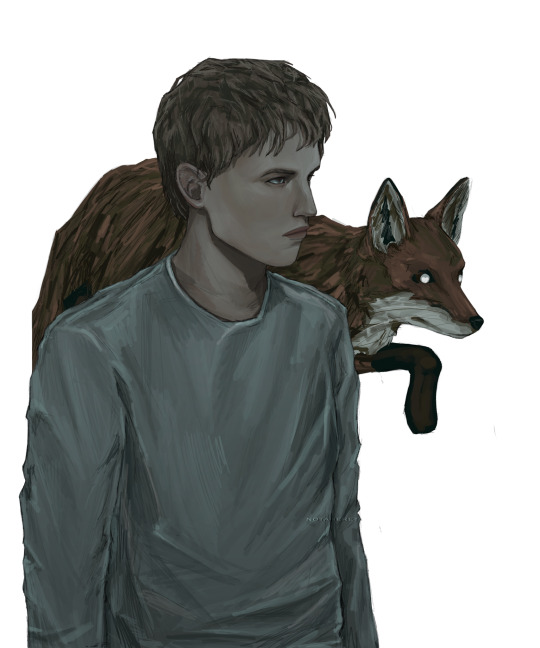

details
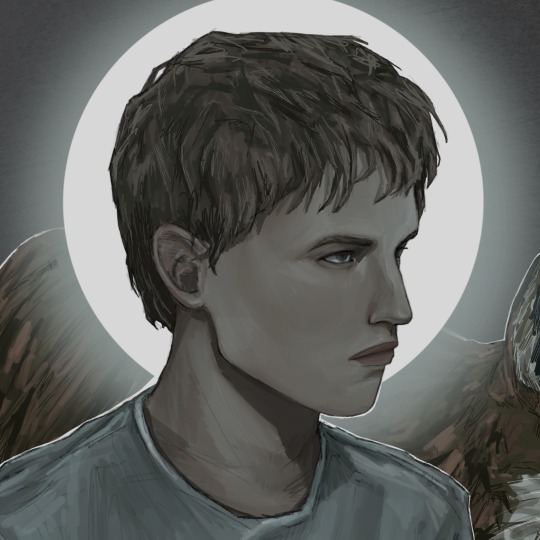

#aaaand here’s alex#why the FUCK is eddie so hard to draw?!?!#you guys are just going to have to excuse the fact that it really doesn’t look much like him#this turned out a little bit better than i expected but it did indeed take three different references to get the desired result#4 hours and 23 minutes#somebody get these hoes better haircuts#the original plan was to have him looking upwards more dramatically but we’re gonna start small when it comes to alex#this is only like my third time drawing eddie but now i want to draw alex again and the voices won’t let me sleep#this one looks very odd. there’s a couple of obvious things i can see now that i would change if i could do this over again but eh.#i’ll worry about that later#ANIMAL SYMBOLISM#i used the same skeleton design for the background with this one as well#like minds#murderous intent#like minds 2006#alex forbes#art#fanart#drawing#digital art#alex forbes fanart#artist of tumblr#eddie redmayne#like minds fanart#i think now it’s time for me to draw them together but what should they be doing??
43 notes
·
View notes
Text
was just thinking










#milgram#So hard for me between muu and kotoko but I feel like the yellow looks really nice on muu#Man I love the anniversary outfits so much I wish there was more fanart of them#Now to go on a rant about how much I love these artwork because no one can stop me#I love how Amane’s cake had little trumpet cookies which remind me of the whole marching band thing in t2#But the lightning bolts…#I’ve bought this up before but Mikoto actually has a split expression here where the right (our perspective) part of his face#Appears to be more shy which makes me think how John has never experienced something like this before which is sad#Too bad it’s just promo art and not canon#I also love how Yuno’s cake represents the staircase from umbilical and Haruka’s has the rabbit plush from weakness kinda#And how all of them have their respective birthday flowers#And the characters who wear earrings having symbolic earrings like what’s shown in their MVs#Like muu having an hourglass with the green slime mahiru having bird cages and mikoto having what appears to be cards
52 notes
·
View notes
Note
What are your thoughts or analyses on the phallic imagery in berserk? Less so the more obvious ones like seen in Casca’s nightmares which are obviously pointing to her sexual trauma, but like we see with the vagina-esque monsters and how Guts’ sword is alluded to being like a penis in some cases. Sorry if it’s a weird question lol
Sorry for the wait on this lol, I was on vacation for a while, and it's also a topic I wanted to spend some time on because I love it and I wanted to be relatively thorough. Thanks for the ask!
So yeah, disclaimers out of the way, Freudian analytical theory is very silly, very gender essentialist in ways that can often be transphobic and misogynist, and as far as I'm aware pretty much wholly unrelated to real psychology. Back in the 70s and 80s you had film theorists who took it seriously as a genuine glimpse into the subconsciousness of humanity or whatever, but now it's pretty much just a readily available source of sex and gender related symbolism that's easy to understand.
And in Berserk I do genuinely think it's a valid lens to view the story through because Miura is often quite heavy handed in utilizing it as symbolism. I mean, Guts literally gives someone an orgasm by stabbing her at one point. Some of this can definitely be a stretch, taking established symbols and running with them, but some of it is also almost certainly purposeful. I'll leave it to you to decide what you see as legit and what you see as stretching believability here.
This is very long lol
So yeah, it starts off strong in Berserk with Guts' oversized sword. Swords are dicks, ie sources of masculine power, especially in Berserk

and in the context of the story the dragonslayer is Guts overcompensating imo. And it's not compensating for a small dick lol, which would be more the purview of comedy, but for a loss of masculinity, ie Guts' childhood abuse from Gambino, and rape trauma. It's about his need to prove himself because he was made to feel like he had to, imo.

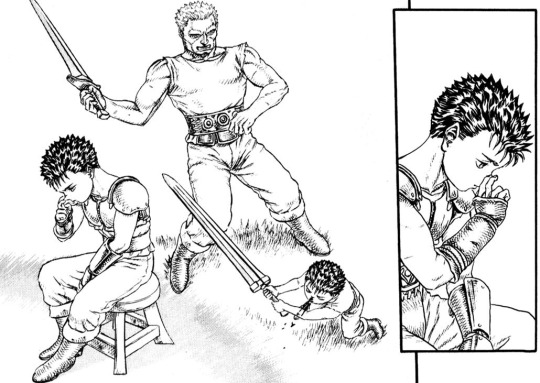
And it's not just the size of his sword, his obsession with it is also a major factor. He has a grandiose speech about how his sword is like a part of his body (hmm) and that it's been at his side through everything and he's always relied on it. The dream he lands on is to be the best and strongest sword fighter ever. He's currently having a breakdown over not being able to hit someone with his sword. He has a recurring tendency to break other guy's swords lol. At one point Casca screams at him that he essentially cares about his sword more than her. etc etc.
In the story dreams are at odds with emotionally healing human relationships, and dreams are represented by swords (Guts' sword obviously, Casca becoming Griffith's sword, Griffith calling the throne a sword while taunting the king in the dungeon as well as his vision of himself throwing him a sword and pointing to the castle in chapter 72).
So through a Freudian lens, Guts' sword can also be said to represent emotional isolation, positioning masculinity as emotionally isolating. Which, yk, fits with Griffith also equating dreams and masculinity in his Promrose Hall speech (a man must achieve a dream before he can have a family or lover) and, I suppose lol, Casca getting "softer" and more feminine as she falls for Guts, as femininity is therefore the opposite: emotional reliance on and support of others.
So if swords are dicks, then it follows that wounds are vaginas, ie yonic symbols. Also pretty obvious when you read some of the lines during the Guts and Casca sex scene lol. "I too want a wound I can say you gave me." These can represent weakness and victimization (I did warn for misogyny lol) and/or (often sexual) relationships and emotional openness.
So you have the relationships - "licking wounds" with Casca; Guts letting Casca stab him when he thinks about abandoning Griffith; the Beast of Darkness calling Casca the wound Griffith left so Guts can keep feeling the pain Griffith caused; Griffith scratching his own shoulder where Guts' sword pointedly didn't wound him; Griffith being out of reach of Guts' sword post-Eclipse; "let's give him a heap of raw iron;" and Farnese grinding on Guts' sword while possessed and Slan directly treating being stabbed as sexual penetration for the most obvious examples...
Also I'd argue that any time Guts gets his ass kicked in a fight it functions as an echo of his rape trauma symbolically and subconsciously to Guts. Both kinda obviously at times, like eg when Slan overpowers him and tears off his shirt while wounding his chest, and kisses him after the stabbing, causing Guts to feel a burst of fear

or when Rosine stabs Guts through the mouth as another enemy who flirts with Guts mid-fight. And of course the first duel with Griffith in which Guts unilaterally sets the stakes to sex slavery because he's projecting.
But also a little more subtlely, such as when Zodd is given the same position as Nightmare Donovan in Guts' concussion nightmare after he kills Adonis, or all this consistent imagery that rapists and apostles tend to get.
Or, interestingly, the way the Berserk armour functions as self-harm as Guts fights by penetrating Guts to "heal" him.

Something that solidifies its hold over Guts and makes him lose more and more of his positive humanity to his urge to kill.
So yeah, from a Freudian angle I'd suggest that Guts is driven to fight to reclaim the sense of masculine power he was stripped of when he was raped, and every fight can be said to be a repetition of his rape trauma in which he (usually) successfully fights back, but also continuously retraumatizes himself rather than healing.

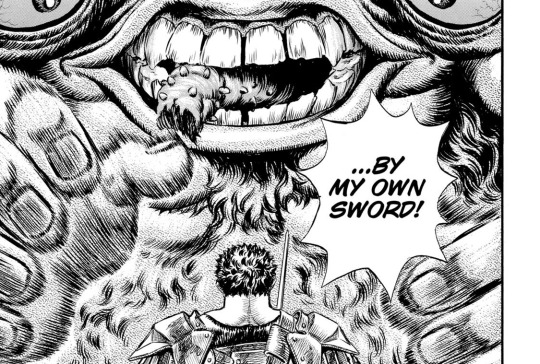
I'm going to delve a little deeper into how phallic and yonic symbols intersect with the characters' relationships now that we've outlined some of the preliminary symbolism, starting from the Golden Age.
The first duel between Guts and Griffith is rife with Freudian symbolism, very overtly. Griffith stabs Guts and then Guts proceeds to have a nightmare about his rape trauma. Then he projects that trauma onto Griffith when he assumes Griffith wants to fuck him and adds sexual stakes to their duel. Then, yk, he takes Griffith's sword into his mouth lol.

Griffith winning by dislocating Guts' arm can be easily taken as a symbolic unmanning/castration, nicely introducing us into Guts' three years of growth towards prioritizing relationships instead of aimless sword-swinging to prove himself. It's also suggestive of penetration when you're primed to look for sexual symbolism (and if Guts offering Griffith his ass and then biting a sword doesn't prime you for it, what does?):

And the two of them losing their swords in the course of the fight and resorting to unarmed combat can also be taken as a telling symbol of the conflict between dreams and their relationship with each other. They lose the symbols of their dreams and contend only with each other, in a more positive contrast to the second duel that ends their relationship, in which they fight only with swords and never touch each other.
Wounds come into it when Griffith nearly gets killed rushing in against Zodd to save Guts, leading to the most impactful moment of their relationship, where Griffith admits he did it solely for Guts' sake and had no other reason. Griffith also points out how wounded Guts is after that fight, in what I'd call a nearly flirtatious way:

And if you follow these symbols completely strictly this scene suggests Guts retreating into his defensive masculinity in his sword exercises after being defeated/emasculated by Zodd and accused of not valuing his personal relationships by Casca, and finally finding a new, more constructive purpose for his sword after Griffith essentially confesses his devotion to him.

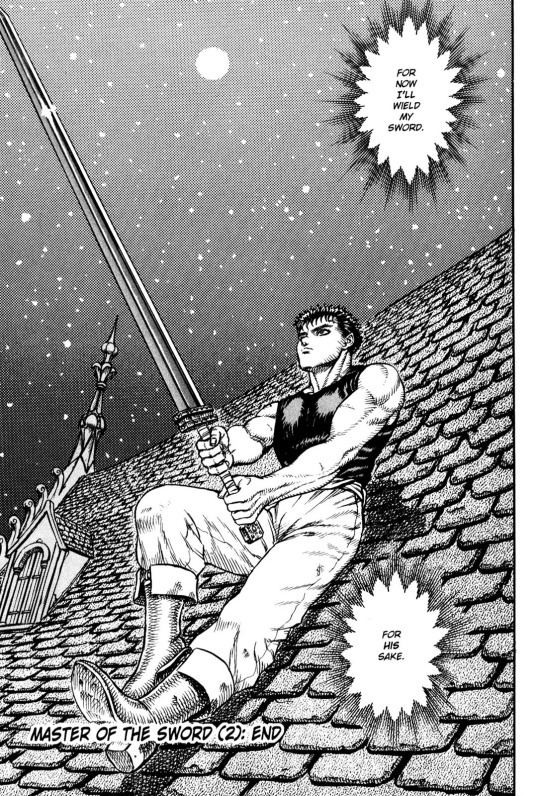
Dedicating his sword to Griffith in return for the wounds Griffith suffered for his sake, with, it has to be noted when the topic is freudian symbolism, his sword held at exactly crotch level.
In the second duel Guts destroys Griffith's sword before leaving, a symbolic castration which is most likely intended to represent and foreshadow Griffith's subsequent loss of power when he throws his life away and ends up tortured in a dungeon for a year. More interestingly imo, is Griffith tracing scratch-markes on his shoulder after sleeping with Charlotte and while crying over Guts - the same shoulder Guts' sword didn't quite hit when he won the duel, drawing attention to the lack of a wound by Guts' hand, a wound he created himself and traces in his devastation.
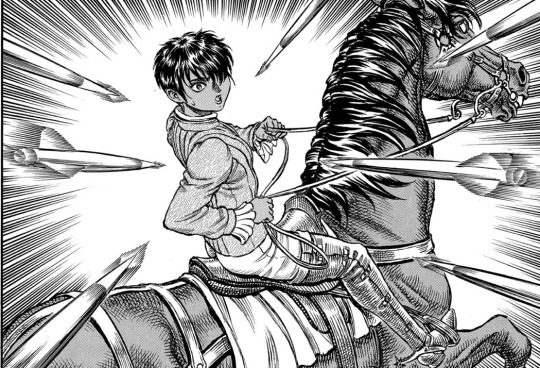
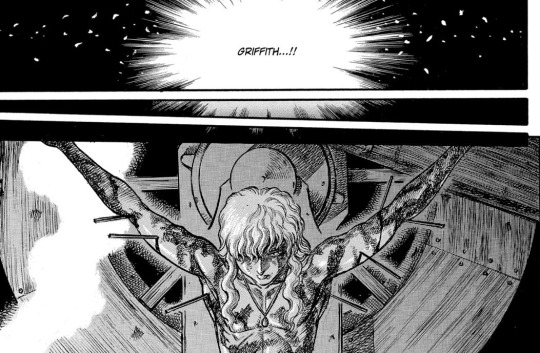
You have a nice... I don't know what the comic terminology is lol so I'm just going to call it a match-cut here, with Griffith and Casca both getting penetrated by the same number of arrows/skewers, to signify Griffith and the Hawks' fall from power, in contrast to Guts' growing phallic power as he pursues his sword swinging. Power which he demonstrates when he returns and saves the Hawks and Casca and Griffith by swinging his sword a lot and defeating a lot of powerful enemies and, if I'm gonna be crass, healing Casca's suicidal despair with his dick lol.
Interestingly though, before he does that he lets Casca stab him while experiencing the guilt of having driven Griffith into a torture chamber by leaving. It's a wound that highlights his emotional connection to Griffith and vulnerability to those emotions, even as he tries to deny them. He then manages to successfully deny them for a little while longer after having sex with Casca.
In this Freudian context, Guts and Casca's sex scene is an affirmation of a relationship, but one which is emotionally uneven, with Casca ready and willing to emotionally rely on and support Guts, but Guts still dedicated to his sword-swinging dream, inviting Casca with him but only as long as she doesn't get in the way of what he wants to do. This does fit with phallic symbols being associated with emotional distance and yonic symbols being associated with emotional closeness lol. (Also fittingly, the one way he does open up to her is about his rape trauma after a flashback.)
It's worth noting that in this disconnect Casca erroneously assumes Guts fought the hundred men and "bled" for her, making her want "a wound" from him in return. Guts fighting those hundred men is much more reminiscent of his fights against apostles, the fights that revolve around replaying his rape trauma to make himself feel better. Casca assumes they already have an emotional bond due to Guts' wounds, but she's wrong - Guts specifically thinks to himself during the hundred man fight that he's not doing it for Casca.
This is reflected in the Wyald fight when Guts insists on fighting Wyald, again as part of the whole reaffirmation of masculinity thing I outlined at the start of this, when Casca just wants him to run away. The Wyald fight is pretty overt about being about Guts' rape trauma imo, moreso than most fights in the story. Wyald's rapiness is made a point of from Guts' point of view when he sees him wielding the torso of a woman sexually impaled on a pike and gets extra angry, and when he literally cuts off Wyald's dick when he's about to rape Casca, and then has his pointed line about needing to "settle the score with him... with them... by his own sword."
SO ESSENTIALLY to sum up this subsection, I think you can argue that what prevents Guts and Casca from being an equal relationship is Guts stlil being hung up over needing to prove his masculine power through sword-swinging, rather than embracing his emasculation (which, remember, tends to signify positive relationships in this context) and coming to terms with it ("immersing himself in sorrow" as Godo says much later.)
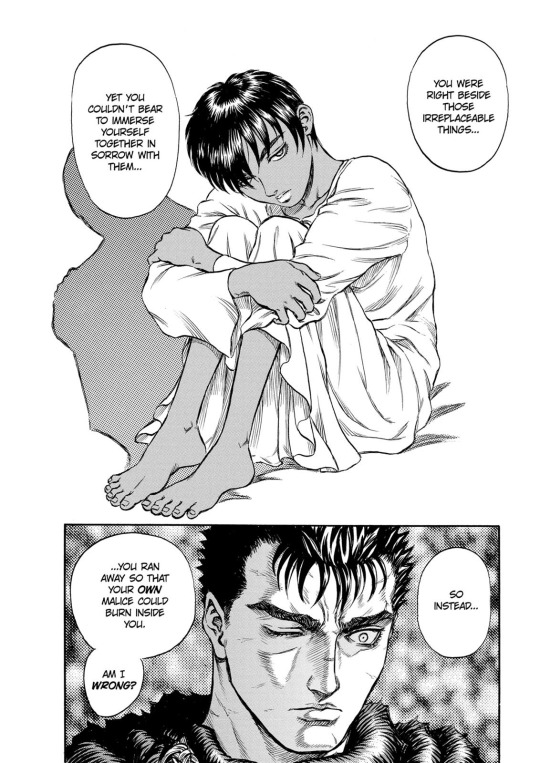
Like, to return to Griffith, it's fitting that after Guts destroys his sword and he goes through a year of torture and is thoroughly emasculated, he's able to recognize his feelings for Guts and understand that Guts is more important to him than the dream, the "sword called the throne."
But he doesn't quite come to terms with his emasculation either. This symbolism is one explanation for the wagon scene where he propositions Casca - a desperate bid for some form of power. Not the strongest explanation imo, but since we're currently in the business of actively looking for this symbolism, it definitely fits. Casca's rejection and pity reinforce Griffith's emasculation, and overhearing her tell Guts to leave again is the final straw. Relationships are a bust, swords are now his only recourse, as we see when he has a vision of himself throwing him a sword and pointing to the castle.

You could take the nightmarish vision he has of a life with Casca as Griffith rejecting emasculation, but an alternate way of taking it is Griffith regaining a form of phallic power, and the emotional isolation that goes with it. After all, it's implied that he has a child with Casca, while totally withdrawn and emotionally isolated.
I once said in a different silly essay that Griffith choosing the dream is, in a way, Griffith choosing another version that nightmare, and that take also fits here.
And hey, it's another reason for Femto to rape Casca lol, if we want to ascribe meaning there, and of course we must in this kind of analysis. In the wagon Griffith essentially offers sex to Casca for the faint vestige of masculine power it could give him (emotional isolation and a child); in his nightmare he imagines that life and it drives him to suicide; and after becoming Femto he forces sex onto Casca and then continues on to embody emotional distance and masculine power.
This power is painfully demonstrated through the rape of Casca, but also subsequently through his pure untouchability (often in pointedly sexualized contexts); through his phony relationship with Charlotte and ascending to the ultimate patriarchal role of king/emperor and taking that sword called the throne; and I guess also through his actual sword lol which he still uses.
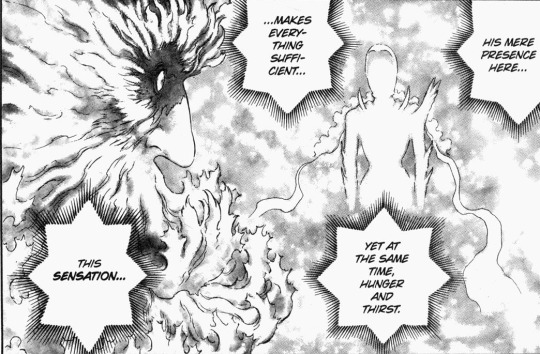
An example of sexualized untouchability - check out the positioning of that third thought bubble, in this scene where Griffith lords his invulnerability over Ganishka.
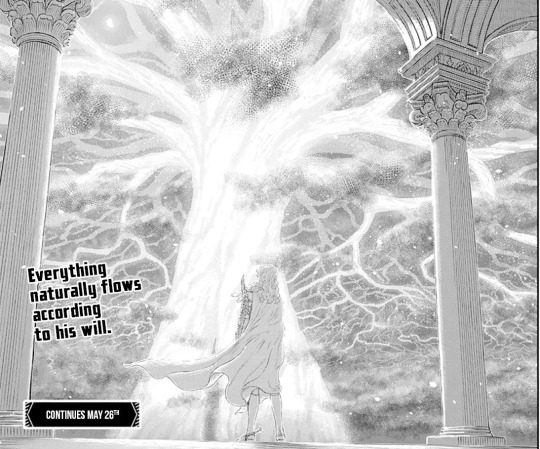
And look at all those pillars, I'm js.
And I'd be remiss not to point out the most recent confrontation with Guts where Guts tries many times to hit his naked body with his giant sword, completely fails, and then Griffith kidnaps Casca. More very on-point emasculation symbolism, it might as well be Guts trying to fuck him but unable to get hard lol. His breakdown afterwards doesn't do much to disabuse you of that notion either.
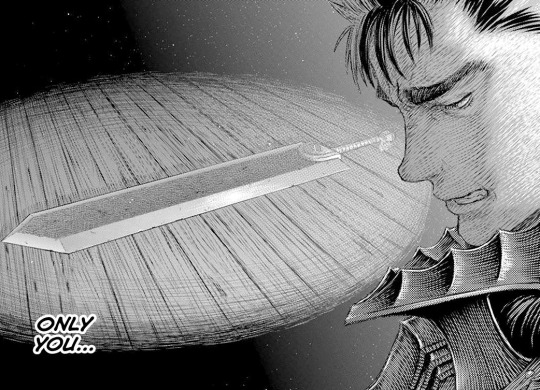
Anyway, back to post-Eclipse Guts. There's not much else to add that I didn't cover at the start, but in brief:
Guts has lost his arm during the Eclipse, which is an emasculation - he loses it while watching Femto rape ~his woman~ so it's like the most traditional symbolic castration there is lol. And of course he replaces it with a bigger, better, and more overt phallic symbol: a canon. And like the first thing we see him do with it is shove it into the mouth of a monster he's banging and blow her head off. So yk, there's that.
And there's Puck, who exists to help bridge Guts' emotional distance and essentially serves as the feminine counterpart to Guts' masculinity for a while. From his magical empathy, to his tiny size, to his lack of genitalia (note that in Freudian theory the lack of a penis is an indicator of femininity rather than specifically the presence of a vagina), to his connections with female characters Theresia and Jill, even arguably to his introduction where Guts saves him from a bunch of men throwing phallic knives at him by skewering them with his own (bigger) projectiles, this is consistent during the Black Swordsman/Conviction arc era.
Chestnut Puck is a lot more boyish, with his particular humour, his cameraderie with an annoying teenage boy, and now having his own feminine counterpart in Ivalera, but that's fine because his thematic job as a feminine influence on Guts is over after Guts starts collecting more friends.
And as far as the RPG group goes, there are a few notable instances of phallic symbolism for them too. Farnese and Serpico are an obvious example, with Farnese sexualizing the wounds Serpico voluntarily suffers for her, when she demands he duel for her honour a bunch of times.

Farnese brandishing the end of her whip at him doesn't hurt the freudian power dynamic symbolism either lol.
In the Conviction arc Farnese wielded a sword she was incapable of using, suggestive of her true femininity under a brash masculine surface, and when she softens in the Millenium Falcon arc she becomes a caretaker with only a small dagger for self-defense. That said, she does get that epic moment of stabbing a tiger in the eye with a long silver pole (candlestick) when she rejoins Guts' crew rather than becoming a housewife, so she still gets some badass phallic weapon imagery lol.
Serpico wields a thin rapier in the Conviction Arc, which Guts easily grabs in his hand, and in the Millenium Falcon arc he switches to a... limp feather duster lol. Serpico is very feminized compared to Guts and his weapons fit as part of that, but they're still effective weapons. You could maybe argue, within this Freudian lens, that this is indicative of Serpico's healthier relationship with masculinity. He's not compensating for anything, he's at peace with himself.
And god I gotta say something about Guts and Serpico's duels. In the first one you have Serpico delaying Guts while Farnese steals Casca from him, and part of that delay is to force Guts into a fight where he can't wield his sword, a parallel emasculation to Casca being kidnapped.
Then you have their confrontation after Farnese's no good very bad night, which is just incredibly suggestive lol.
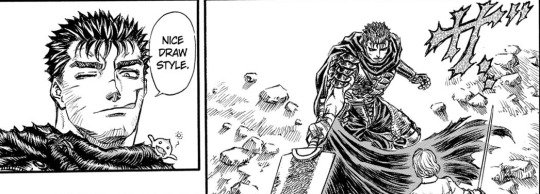

You cannot tell me this isn't Guts getting blueballed when Serpico leaves after one quick exchange. Particularly coming in the same chapter featuring possessed Farnese grinding on Guts' sword (which Guts was much less interested in, incidentally). Also: wounds as sexual imagery again. Guts licking the blood off his cheek? Come on.
And finally you have their fight in Farnese's basement, in which Serpico attempts to hinder Guts by surrounding him with giant pillars, which Guts smashes through as he dodges around them. Another neat illustration of Guts' pure phallic power and Serpico's much more effeminate style.
One final note to address part of your ask, which didn't naturally fit into the rest of this lol: I would interpret vaginal imagery in monsters as mainly castration anxiety, yk, vagina dentata vibes, the fear of sticking your dick in a hole you can't see into. There's actually a lot of interesting stuff to consider in terms of the feminine as the unknowable other when it comes to Freudian theory, but that's like, not something I would expect Miura to lean into first of all, and also it would take another essay of explanation. If you're interested in that kind of Freudian analysis though I'd recommend the books Men, Women, and Chainsaws by Carol J. Clover and The Dread of Difference, edited by Barry Keith Grant. I took a course on women and horror films ages ago and read chunks of those, and it was very fun, and iirc both address Freudian imagery in horror.
Okay! So that's the rundown of like, all the examples of Freudian imagery that interest me at least lol. This isn't exhaustive ofc, Berserk is long and not stingy with this stuff, but this response is already so long and meandering lol, so I'm going to wrap it up here.
To sum up, phallic imagery often represents masculine power as well as masculine flaws (like emotional isolation) in Berserk, while yonic/vaginal imagery tends to represent feminine weakness as well as feminine virtues (like emotional connection and vulnerability). As a general rule, the more phallic imagery someone violently swings around, the more fucked up they are. Phallic violence is used to compensate for past trauma, but it only continues the cycle of violence. The way to break that violence is to accept one's wounds and focus on them, to heal, rather than trying to distract from them.
I don't think this is always the best way to interpret Berserk lol, but it adds another dimension that very often complements the surface meaning and thematic resonance of the story, sometimes purposefully, sometimes likely incidental. And either way it's a lot of fun to read into!
#genuinely thank you for asking lmao this was so much fun to write#sorry it took forever though i had a lot of shit going on the last couple months plus a bunch of other asks that didn't require#as much effort lol so i only worked on this intermittently#ask#anonymous#a#b#theme: symbolism#theme: revenge#theme: relationships as personal growth#theme: isolation#theme: trauma#character: guts#character: griffith#arc: ga#arc: mf#arc: bs#(just a note: i've used image descriptions on a few of these images but not all. that's deliberate - i've described the ones that aren't#naturally described by what i've written in the post itself. generally i try to word my posts so image descriptions are unnecessary but#there are a few here that would be clunky without descriptioins)
66 notes
·
View notes
Text
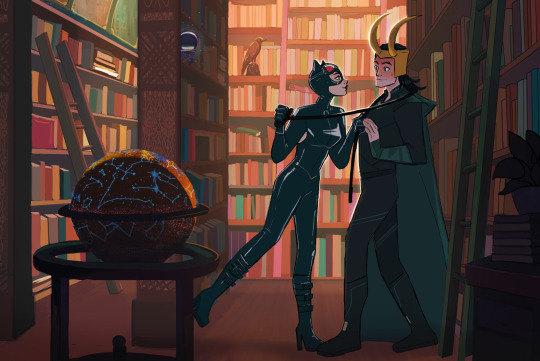
Loki & Catwoman commission by the brilliant Debbie Balboa! (Somewhat inspired by this fic!)
#loki#catwoman#mcu#batman#debbie balboa#AHHHHHHH I love them so much#just two sharp anti-heroes out here sharpin'#byo raven and labyrinth symbolism#godcat#loki/catwoman#god seeks thiefspiration#godcatstorming#I will go down with this rarepair ship and my bones will sing blissful stib-stab shanties at the bottom of the sea
33 notes
·
View notes
Text
It had started because some people had misheard something Phantom said. One singular letter was responsible for the mess he was in right now.
They thought Phantom had said "Dad"
He had not, not this time at least, he was, admittedly, rather prone to accidentally calling Jack "Dad" because the man actually was. Though those moments were nothing compared to this.
It had spread like wildfire throughout the school, and then the city as a whole. Phantom had a dad, a dad who was visiting next week. That's what they knew, and theories and questions were already abound. Was Phantom's dad alive? Or dead too? What was their relationship like? Was this mysterious dad Phantom's blood (ectoplasm?) father? Or was Phantom adopted? How similar were they?
Dan just laughed at Danny over the phone when he tried explaining the situation to his older self before he came by to visit.
#danny phantom#i was going to make a proper fic but um. i couldn't choose a direction to go in with it. so heres just me writing down the concept ndksnsks#i just think Dan pretending to be Danny Phantom's dad would be really funny#obv they look similar. maybe people'll assume the DP logo is some sort of family symbol lol#honestly this could work post or pre agit. though the bit here is written as post#pretending not even necessary people could just assume. the “family drama” thatd ensue from a pre agit Dan who is Very Much trying to kill#would be very fun i think#and he'd most certainly play along if he was aware of the assumption#anyway daisybell stop making dp posts at midnight am to inevitably wake up and hate how they're worded challenge impossible
22 notes
·
View notes
Text
Loki telling the Avengers he's never had a family before them all and Thor is sitting in the back of the room spitting out his coffee sobbing crying he feels sick to his stomach
#Thor like THEN WHAT AM I????#Loki like YOU'RE LIVING HERE TOO WHAT"S THE PROBLEM????#Thor like you very much had a family you have a family what was Asgard to you the past millennia and a half#Loki like um a fake family i thought we went over that when it was clear they lied to me (and you) our entire lives ?#Thor should feel sick about it actually#I don't think Thor ever Got the fact that if Loki was being disowned/separating himself from the family that includes. their parents.#i don't think he comprehended that if Loki doesn't consider them his parents anymore he wouldn't consider them his parents anymore#i think Thor just assumes it's symbolic or something or that inevitably Loki will get over it and come back btw#i think that should happen if post-Avengers 1 Loki is banished to Earth#and I think Thor should actually be upset and feel sick aobut it#i think Thor didn't understand that being lied to hurt Loki even when he watched Loki let go on the bifrost
58 notes
·
View notes
Text
Something something about Buck and learning and or teaching.
Something something about Buck teaching when he really needed to be learning.
I just keep thinking about how the show has increasingly - especially last season - put Buck into the role of 'teacher' - including his coma dream. (i'm using teacher for the lack of a better term!) and how in the aftermath of the coma dream - he's been trying to teach but it hasn't worked - instead he's been learning.
I've been musing on the fact that even back in season 1 Buck has been in a teacher role -
Abby learning to chose herself and go for her happiness,
Bobby learning to let people in and Buck being a major part of that because of their developing father-son type relationship
'teaching' Eddie that he could rely on other people for help
Maddie learning at Bucks hand that she didn't need to keep running, that she could lean on him for support and build a new life for herself
Ravi being tutored by Buck in the fire house
even Lucy being given advice by Buck - teaching her through his own experiences in dumb luck
Buck making himself into a teacher in his coma dream and the idea that all these people he has helped teach teaching him that he has a place with them and that he is important
and so many more examples through the seasons that I won't list or I'd be here forever!
Because there has been a lot of emphasis on teaching and learning since Buck woke up from his coma - he learnt he was good at maths, but then wasn't allowed to help Chris with his maths homework because it would be cheating.
used his maths skills to win at Poker - but got taught lessons even in victory - rather than teaching others lessons (whatever they might have been)
Natalia being interested in him because he could teach her about death and things going south pretty quickly when it became evident that Buck needed to learn how to live again rather than be stuck in death
And now we've had several mentions by Tommy of him teaching Buck things - teaching him to fly, teaching him Mauy Thai, all the way to him being his bi awakening is teaching him about a part of himself he didn't know. Things are turned on their head - Buck is the student not the master now
Even with Eddie this season, we've seen him teaching Buck things - rather than Eddie learning from him - Eddie handing over this really important thing going on with Chris - Eddie knowing that Buck would be a better option - that Chris would open up to him more - is teaching Buck about his importance in the Diaz family - re-enforcing that he is part of their life. Its also Eddie who has had the good advice for Buck this time rather than the other way round.
Something something about 'you like to be the guy with the answers' to Buck becoming the guy with the (maths) answers - only for it to fade away and now he's having to learn
Something something about the tie to Buck and death and the resurrection and how Christ was the teacher up to and immediately after his death and resurrection when he left others on earth to spread his teachings and he ascended to learn at the right hand of god
Something something about how that is the key to happiness and that is what Buck has figured out and that is why his journey to figuring that out has had him wearing the bright blue - because in Christianity - that shade of blue is the colour of the kingdom of heaven (because it is the colour of the sky!) so putting Buck in it at all these key markers of his journey is showing him as being on the road to ascension.
This post is a mess - I don't even know what it is any more! I started with one idea about teaching and Tommy and then more kept coming and we ended up here!!!!
#I know technically that they all teach and learn from each other and that others were also involved in these scenes#but I'm just interested in the fact that the tables have now been turned on Buck specifically and he is now the student#I think thats interesting as a character study - Buck who learnt to survive on his own and teach himself now getting to go back to learning#look here I am - atheist me blabbering on about religious symbolism around Buck once again!!!#Im fascinated in it though - especially in relation to Eddies catholic guilt and the way that the show is using much more#scientific symbolism around him - hearts and guts and the mind - all working organs (or groups of organs)#that have these metaphorical and intuitive attributes attached to them#but all have important real world functions that a human need to survive#and the fact that we've got Buck to this point of 'ascension' and Eddie effectively working on the last of the three - the gut#well I think that is pretty telling - once Eddie has his gut under control/ worked out (catholic guilt) then he will be in a position to#'ascend' as well.#and don't even get me started on the triangle symbolisim within all of this - the holy trinity and the trifecta of heart mind and gut#because they are playing into the triangles this season - literally every where!!!#I feel like at this point if they put Buck in purple (esp if hes wearing it when buddie go canon) - the holiest of colours and#one associated with magic -then I will be the one ascending - because that would be the ultimate#this show is insane!!#it makes me insane - I'm insane!!#evan buckley#eddie diaz#911 abc#911 meta
21 notes
·
View notes